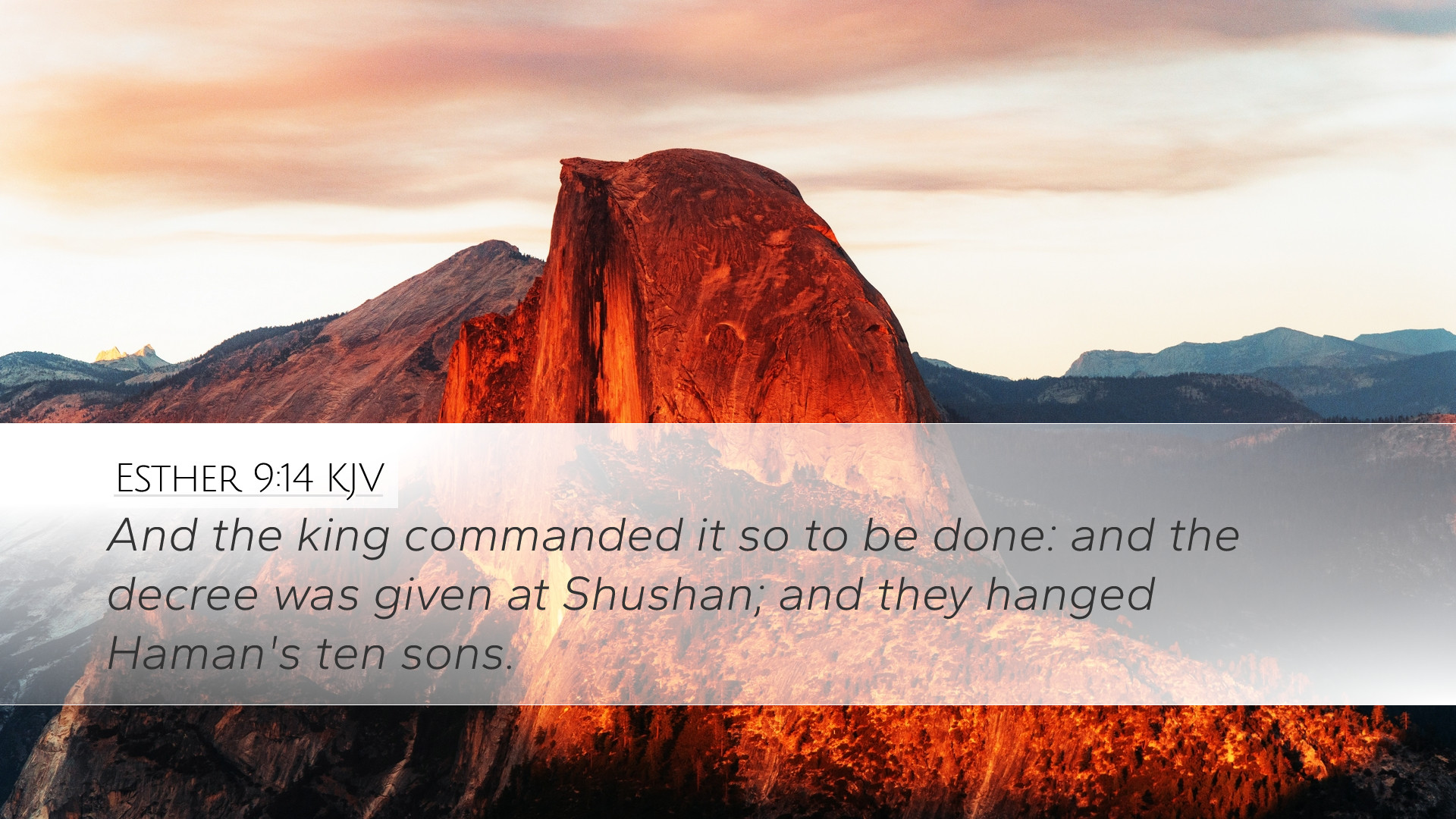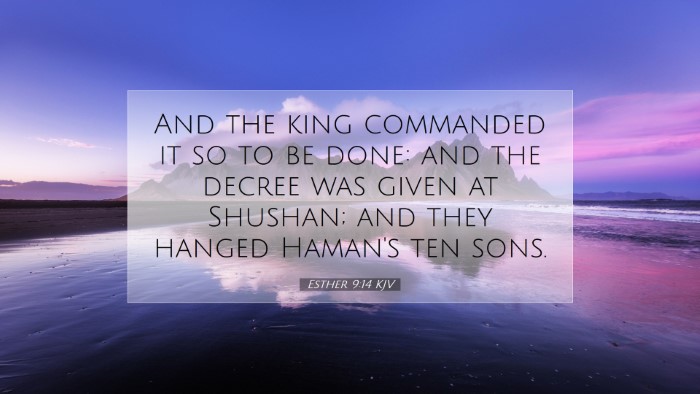Commentary on Esther 9:14
Verse Citation: Esther 9:14 - "And the king commanded it so to be done: and a decree was given at Shushan, and they hanged Haman's ten sons."
Background Context
The Book of Esther, part of the Hebrew Bible, portrays the deliverance of the Jewish people from the plot of Haman, a royal official who sought to exterminate them. This verse occurs in the context of a celebration of victory known as Purim, which commemorates the events that led to the Jewish people's salvation. The incident emphasizes God’s providence in history and the moral consequences of pride and hatred.
Commentary Summary
Matthew Henry's Commentary
Matthew Henry comments on the decisive actions taken by King Ahasuerus as a demonstration of justice served against evil personified in Haman and his sons. He notes that the hanging of Haman's sons symbolizes not merely retribution but serves as a stark reminder of the consequences of plotting against God's people. Henry emphasizes the theme of divine justice in this narrative and the necessity of decisiveness in confronting evil.
Albert Barnes' Notes on the Bible
Albert Barnes elaborates on the implications of the king's decree. He opines that the execution of Haman's sons was not only a matter of personal vengeance but a crucial action to prevent any future attempts to usurp the rights and lives of the Jewish people. Barnes draws attention to the significance of this event being decreed from the highest authority, marking a profound turning point in the history of the Jews within Persia. He highlights that this act, while grim, served a purpose in safeguarding the community.
Adam Clarke's Commentary
Adam Clarke provides a detailed analysis of the various commentaries surrounding the motivations behind the king's command. He points out that the hanging of Haman's sons was a means of eradicating the legacy of their father's treachery. Clarke dives into the cultural practices of justice in ancient Persia, likening it to a warning against rebellion. This act of justice not only delivers the Jewish people but signifies their newfound authority and the favor they earned in the eyes of the kingdom.
Theological Insights
The events surrounding Esther 9:14 offer deep theological implications, particularly regarding the sovereignty of God and the role of human action in enacting divine justice. The narrative showcases how God can use secular authority to fulfill His purposes. God's providence is markedly evident, demonstrating that even amidst peril and oppression, He orchestrates events for the ultimate good of His people.
- The Sovereignty of God: The unfolding events leading to this verse illustrate God's control over human affairs, guiding even the decisions of kings for the protection of His chosen.
- Moral Consequences: Haman’s demise and the punishment of his sons illustrate that rebellion against God and His people has serious repercussions.
- The Nature of Justice: The execution of justice shows the necessity of accountability in leadership and the importance of responding vigorously to threats against God’s people.
Practical Applications
For modern readers, particularly pastors and theologians, this passage beckons a reflection on how to stand firm against injustice within society today. Further, it presents an opportunity to explore the complexity of forgiveness, justice, and the grace of God. Leaders in ministry can draw from this text the importance of discerning when to act decisively against evil and how to shepherd their communities toward both truth and love.
- Leadership and Responsibility: Godly leadership entails a commitment to justice and the well-being of those under one's care.
- Courage in Confronting Evil: The narrative challenges believers to respond with courage to societal injustices, drawing strength from God.
- Celebration of Deliverance: The celebration of Purim highlights the importance of rejoicing in God’s deliverance and faithfulness in our lives.
Conclusion
Esther 9:14 serves as a poignant reminder of the intertwined nature of divine providence and human action. Commentators like Matthew Henry, Albert Barnes, and Adam Clarke collectively illuminate the spiritual significance of this verse, emphasizing justice, accountability, and the overarching sovereignty of God. As pastors and scholars reflect on this passage, they are encouraged to see beyond the immediate event, understanding it as part of God’s unfolding narrative of redemption and justice in a fallen world.


